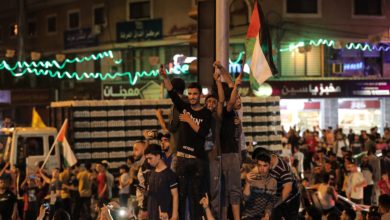I had just turned 10 when the United States invaded Iraq, and many young people today are understandably confused about the complex situation that is developing there now. Our memories of that war, or at least the beginning of that war, might be fuzzy. Our older sisters and brothers may have fought and died, but not our friends and classmates (although they might have been sent to the slaughter in Afghanistan). It’s extremely important to understand the basics of that conflict to get a handle on what’s going on today.
Installing a puppet regime in Iraq that would serve the interests of U.S. imperialism has been a long-standing goal of the U.S. government, under both Republican and Democratic administrations.
In 1958, a mighty popular revolution overthrew the king and kicked out the British imperialists who had dominated Iraq since 1920. The Iraqi Revolution made Iraq an independent country for the first time in modern history and terrified the rulers in Washington as well as London who feared that they could lose their grip on the entire oil-rich region. The new government was led by leftist and nationalist military officers, and supported by the then-powerful Iraqi Communist Party. The ICP drew its members from all segments of the Iraqi population with no distinction based on ethnic or religious background.
In 1963, a right-wing faction of the Arab Baath (Renaissance) Socialist Party (ABSP) led a coup and took over the government of Iraq. The right-wing Baathists brutally repressed their communist rivals, slaughtering thousands, with the help of the U.S. Central Intelligence Agency, before they were pushed out by another faction of Baathist military officers several months later. From that time until the U.S. invasion of 2003, the ABSP was the dominant political party in a succession of secular Iraqi governments.
Over the next four decades, the relationship between the U.S. and Iraq shifted between extreme hostility to guarded collaboration. But the Iraqi government never became a puppet or client state of Washington, like so many other governments in the region. From the U.S. imperialists’ viewpoint, independent states are an obstacle to domination.
In 1991, the U.S. government and its subordinate regimes in the Middle East engineered a situation that provoked an Iraqi intervention in Kuwait. The resulting U.S.-led war, known as the Gulf War, involved a murderous aerial bombardment of Iraq that led to the country’s international isolation, but not the overthrow of the ABSP-led government headed by Saddam Hussein.
The period from 1991-2003 was defined by genocidal sanctions – a near total blockade of the country — imposed by western imperialism, coupled with frequent air strikes that claimed more innocent lives. According to United Nations estimates, more than a million Iraqis, including half a million children, died as a consequence of the sanctions blockade. Still, the U.S. government was unable to carry out “regime change,” which became the official U.S. government objective under President Clinton in 1998.
U.S. imperialism finally achieved its goal in 2003, when a ground invasion was carried out on the transparently ridiculous grounds that Iraq had “weapons of mass destruction.” A “shock and awe” bombing campaign routed an Iraqi military weakened by 13 years of sanctions and war.
A U.S. operative named J. Paul Bremer, was installed as a virtual dictator of Iraq. Bremer dismantled the entire Iraqi government and military.
But then something happened that the war mongers did not predict – the Iraqi people fought back against the occupation. Since the overthrow of the Soviet Union in 1991, U.S. imperialism had been on a winning streak, and the system’s managers harbored illusions of a 21st century of unchallenged U.S. dominance. The Iraqi resistance, albeit composed of groups with widely varied ideologies, accomplished an enormously important feat – they stopped this offensive in its tracks. Their courage was a true service to not only the people of Iraq, but all of humanity.
This is where the direct link to the current crisis in Iraq comes in. To pacify the country in the wake of this uprising, the U.S. government turned to one of its favorite strategies – divide and conquer. The United States had long maintained ties with opportunistic Kurdish political leaders, an oppressed nationality concentrated in the north of the country, so they set their sights on fomenting civil war between Sunni and Shia Arab Muslims.
In the ensuing chaos, in which over 1 million Iraqis were murdered, the U.S.-led occupiers (Britain was given control of the strategic southern city of Basra and surrounding areas) armed rival militias. The policies of the new puppet government were tailored to heighten animosity between Sunnis and Shiites.
When the country was sufficiently destroyed, the occupiers crafted a fragile truce and attempted to consolidate the authority of the central government headed by Nouri al-Maliki. In 2011, the bulk of U.S. troops left the country.
Maliki, a sectarian Shia politician, has enacted policies and built key state institutions in a way that further alienated Sunnis and Kurds – maintaining power in the ways that his imperialist patrons taught him. This was largely responsible for creating the circumstances that allowed the Islamic State of Iraq and Syria, an ultra-reactionary group that until very recently was an official al-Qaeda affiliate, to capture large swaths of Iraq despite having a relatively miniscule military capacity.
Now, calls to re-form Shia militias are being issued, and the seeds of chaos and death planted by U.S. imperialism are sprouting into what could easily become another civil war.
Everyone has a duty to make sure that a monumental crime like the U.S. war on Iraq never happens again. Let’s mobilize for recently called protests against a new war on Iraq, and continue to fight against aggression targeting Syria, Venezuela and everywhere else.






